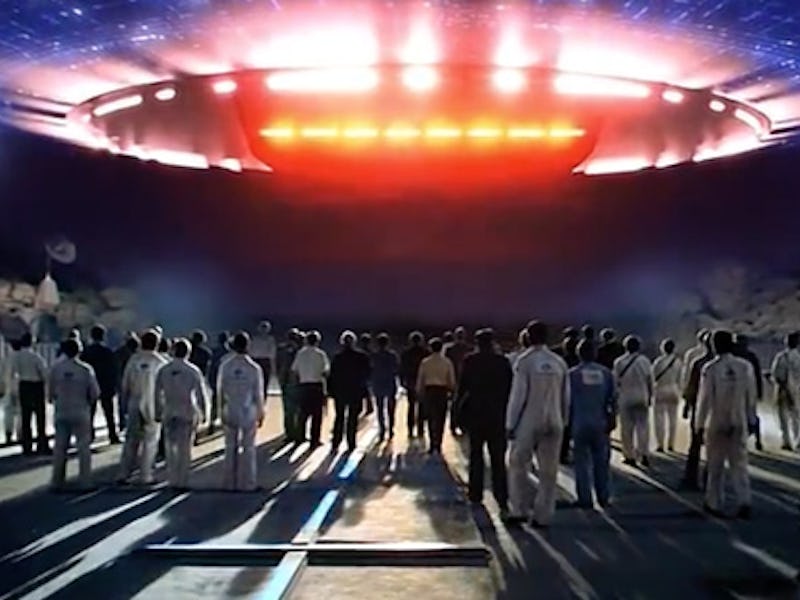The Largest-Ever Survey of Public Sentiment About Aliens Begins This Week
Researchers from the UK SETI program are offering the chance at the Royal Society’s summer science exhibition

Without any doubt, the most perplexing question in science fiction over the last 40 years is how humanity’s first contact with an alien race actually happen.
Will an adorable alien become stranded in Burbank, California, as his survey mission accidentally leaves him behind?
Will a race of inquisitive extraterrestrials land in Wyoming while kindly returning everyone they’d previously kidnapped?
Or will a scout ship of pointy-eared humanoids land in Bozeman, Montana, after detecting the signature left behind from mankind’s first warp test flight?
Members of the UK SETI (Search for Extraterrestrial Intelligence) Research Network (UKSRN) might not know for sure, but they certainly dare to dream and they’re curious as to what the public thinks, too.
This week, they’re launching what they believe is the largest-ever survey of public attitudes towards alien contact at the Royal Society’s summer science exhibition, in London.
Gort! Klaatu barada nikto! Mankind was given an ultimatum in the epic 1951 movie The Day the Earth Stood Still
They hope that the opinions they gather will help determine the foundations for an international plan of action that lays out the ground rules on how the news should be shared when any signals are detected, what sense can be made of those signals and how — if at all — we might reply.
While we might fantasize about aliens landing next to the Washington Monument and saving humanity from destroying itself – or at the very least, giving us a jolly stern warning – confirmation of an alien intelligence will more than likely take the form of receiving a radio transmission, much like what we saw take place in the 1997 movie adaptation of Carl Sagan’s novel Contact starring Jodie Foster.
“To begin with, there are two kinds of discovery of life in space,” Dr. Seth Shostak, Senior Astronomer at the SETI Institute in Mountain View, California, tells Inverse. “One is the discovery of microbes and we saw that in 1996 with the martian meteorite story. The public was interested and the media was modestly interested. So, what happens when you think you’ve picked up a signal is that you keep checking it and you ask other scientists to check it. It would take time to confirm and to decipher.”
A far more realistic scenario is the detection of a radio signal, like in the 1997 movie 'Contact'.
“They might be in a completely different part of the world. So, now they all know about it, and then they might get somebody else to confirm it. Existing protocols say, to announce it to the world: check it, then tell everybody. But it also says ‘don’t broadcast anything back without getting some sort of international agreement because you don’t want one country to monopolize this’ — and that’s just nutty, because if they’re 300 light-years away, what’s the hurry anyhow?”
"We don’t know anything about an alien sociology and the conclusions they’d make. I think that what they’d find is that, probably, the planet is ruled by cats"
And don’t forget, any serious amateur radio astronomer with a half-way powerful transmitter could send a reply. Oh yes. Upon receiving a signal made up of prime numbers containing the blueprints to build a transport to an alien world through an Einstein–Rosen bridge, supremely intelligent alien beings that have been in existence for millions of years could be bombarded with cats that look like Hitler, karaoke videos and cooking shows.
So maybe we shouldn’t reply at all.
Should We Attempt to Contact Aliens?
In 2016, the late Stephen Hawking warned that humans should in fact not alert alien civilizations to life on Earth, for fear of being conquered, but other researchers disagree.
“The idea that there’s going to be international coordination of all this, and everybody’s going to decide what’s best, maybe in the movies, but not in reality. I’ve written white papers on this,” says Shostak.
“In fact, the last paper I wrote on this, I said, ‘if we were to broadcast something, instead of having a committee deciding what it should be, I would just send the Google servers’ — just send the entire internet, they’d be able to figure that out.”
I, for one, welcome our new feline overlords
“If you just send short messages like the Pioneer plaques, or the Voyager records, or all these short broadcasts that have been made to be a receivable message, that’s kind of a waste of time. You want to send lots of material.”
“We don’t know anything about an alien sociology and the conclusions they’d make. I think that what they’d find is that, probably, the planet is ruled by cats.”
Messaging Extraterrestrial Intelligence
Later this year, an organization called Messaging Extraterrestrial Intelligence International plans to beam signals into space containing references to the periodic table of elements. This is not the first time an official signal has been sent into deep space. In 1974, scientists at the Arecibo radio telescope in Puerto Rico sent a radio message about life on Earth to a group of stars 25,000 light years away called the globular star cluster M13.